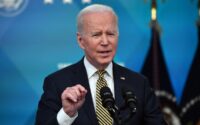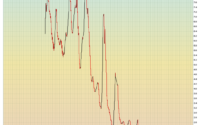Yen Slides to Two-Decade Low, Reigniting Focus on Intervention
(Bloomberg) — The yen extended a twenty-year low against the dollar Tuesday, weighed down by the widening gap between yields in Japan and the US, stoking speculation over potential intervention.
Most Read from Bloomberg
The currency fell as much as 0.3% to 132.33 per dollar — the lowest since April 2002 — with benchmark Treasury yields trading above the closely-watched 3% level. It slid to a seven-year low against the euro, heaping pressure on a Japanese government facing a backlash over rising prices.
Japanese companies and households have become increasingly vocal about the negative effects of the weaker yen, as input and energy costs soar. A further slide will put pressure on the consensus between a central bank determined to stoke inflation and a government desperate to avoid a cost-of-living crisis ahead of a national election in coming months.
Yen’s Historic Fall Signals Rewrite of Global Currency Playbook
“The Bank of Japan is now the only central bank among developed nations which isn’t tightening monetary policy and this has strengthened yen crosses, leaving the yen as the only loser,” said Takuya Kanda, general manager at Gaitame.com Research Institute in Tokyo. “The next target technically is 135.15, so 132 and 133 are just passing levels toward that target.”
The yen has been in freefall this year as a dovish BOJ keeps local yields anchored in a bid to boost a moribund economy while US equivalents surge on rising interest-rate expectations. The currency has also suffered from Japan’s position as an energy importer, at a time of rising oil prices.
On Tuesday, Japan’s Finance Minister Shunichi Suzuki said the government is monitoring the currency with a sense of urgency, and repeated that disorderly moves can have negative impact.
A Trader’s Guide to Japanese Policy Makers’ Language on the Yen
In a speech on Monday, Bank of Japan Governor Haruhiko Kuroda affirmed that policy tightening still wasn’t on the table, indicating that the economy still needs more time to recover as the country lacks enough wage growth.
“In this situation, monetary tightening is not at all a suitable measure,” he said, suggesting the bank focus instead on bolstering economic activity.
As a result, the divergence between the dollar and yen isn’t likely to reverse course anytime soon, according to Brendan McKenna, a strategist at Wells Fargo.
“We expect the Fed to keep hiking and for the Bank of Japan to keep rates on hold for the foreseeable future,” he said. “As long as those dynamics are present, the yen should keep weakening.”
Most Read from Bloomberg Businessweek
©2022 Bloomberg L.P.
[ad_2]
Source link


